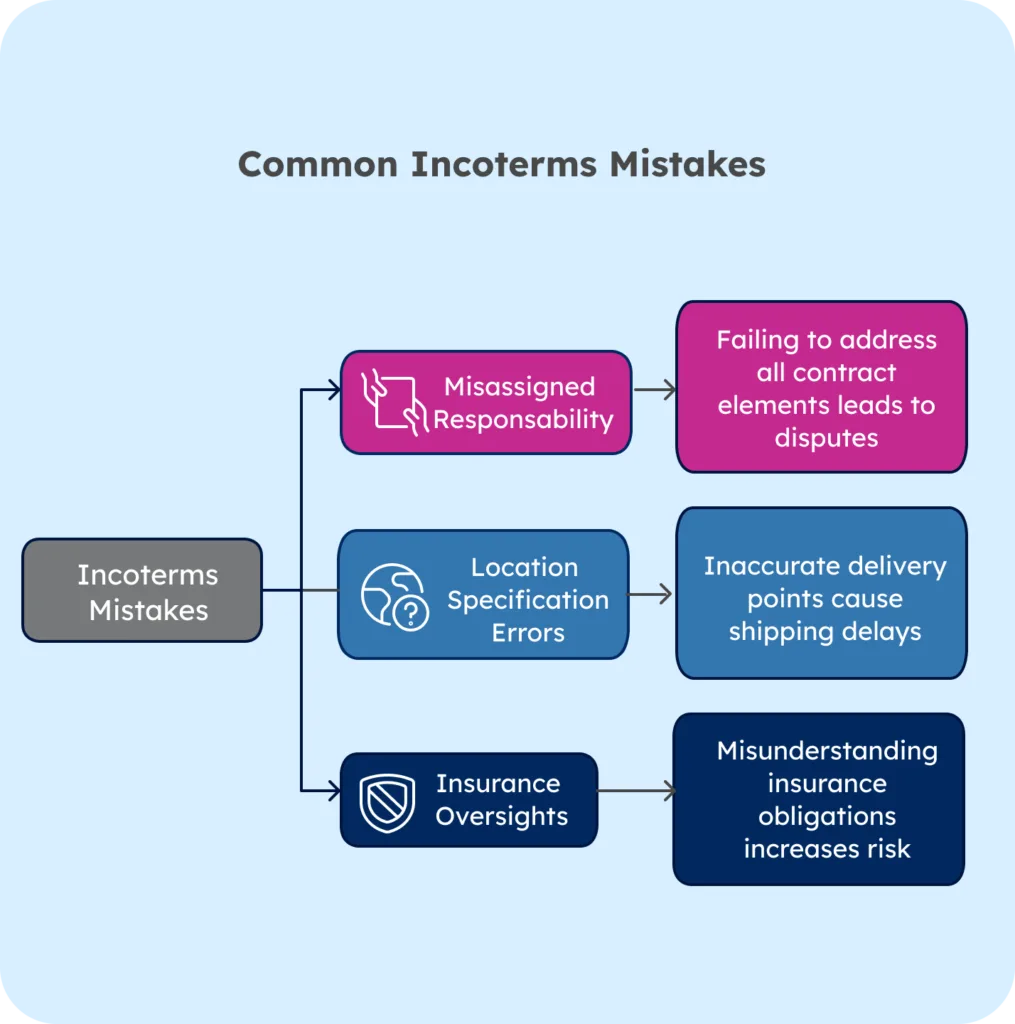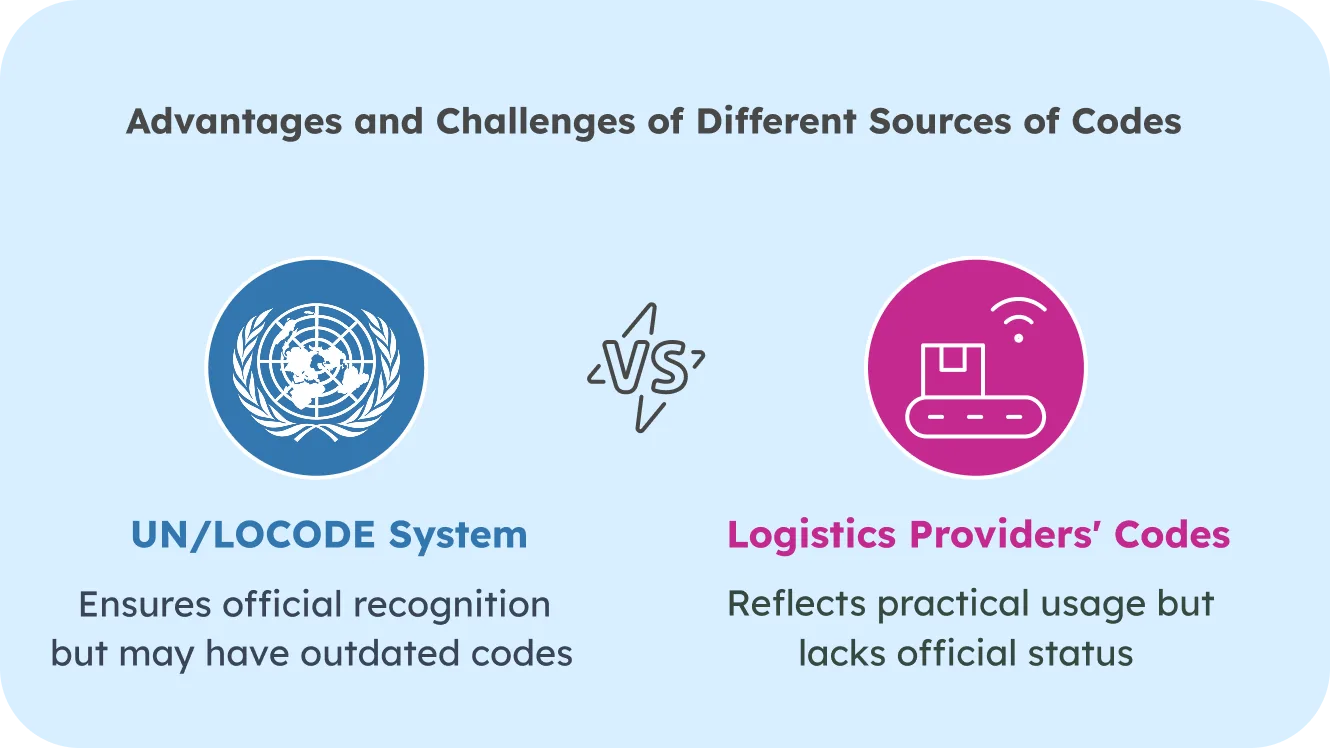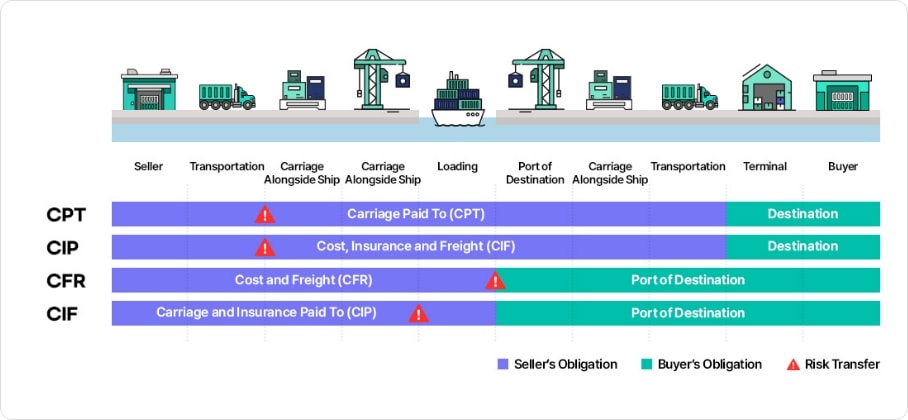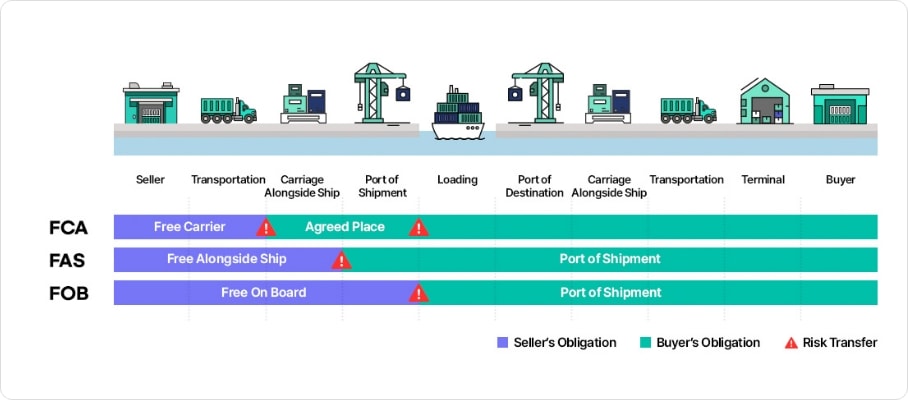Introduction
International trade can be challenging, especially when navigating complex shipping processes across global markets. Therefore, it is essential to clearly define responsibilities between buyers and sellers. The proper use of Incoterms—internationally recognized trade terms developed by the International Chamber of Commerce (ICC)—is vital for smooth shipping operations. However, mistakes with Incoterms still often occur and lead to unexpected costs, disputes, and shipment delays.
Usually, ambiguous location specifications are common causes of such mistakes. Verified zip codes and accurate address formats are fundamental for effective Incoterms implementation.
💡 Use comprehensive zip code and UNLOCODE databases to clarify shipping and delivery points. At GeoPostcodes, our accurate and up-to-date data aids businesses in confidently managing shipping responsibilities, eliminating ambiguity, and streamlining their global logistics operations. Browse GeoPostcodes’ datasets and download a free sample here.
This article highlights the top 5 Incoterm mistakes businesses should avoid and explains why choosing the right Incoterm is only part of the solution. Also, it demonstrates how integrating accurate geospatial data into your shipping processes can minimize risks and improve international shipping efficiency.
Understanding Incoterms and Their Role in International Trade
International trade operations rely heavily on clear communication and well-defined responsibilities between parties. Incoterms, developed by the International Chamber of Commerce (ICC), are the fundamental rules governing international trade transactions. These standardized terms define the specific obligations, costs, and risks associated with the global transportation and delivery of goods.
Incoterms are crucial in establishing clarity about who is responsible for various aspects of the shipping process in commercial contracts. They determine essential elements such as who arranges and pays for transportation, who bears the risk during different stages of the journey, and where precisely the transfer of responsibilities occurs. This standardization helps reduce misunderstandings and potential disputes between trading partners.
Common Incoterms Mistakes
The complexity of international trade often leads to critical mistakes when applying Incoterms. Understanding these common pitfalls is essential for smooth shipping operations and preventing costly disputes.

Incorrectly Assigning Responsibilities in the Sales Contract
One of the most significant challenges in international trade arises from misunderstanding the scope and limitations of Incoterms. While these terms are powerful tools for defining shipping responsibilities, they don’t cover all aspects of a trade agreement. Many businesses make the mistake of relying solely on Incoterms without properly addressing other crucial elements in their sales contracts.
The scope of Incoterms specifically covers obligations related to the delivery of goods, including transportation arrangements, risk transfer points, and cost allocation. However, they do not address critical contractual elements such as product specifications, quality standards, or payment terms. To ensure comprehensive coverage of the trade agreement, these aspects must be separately defined in the sales contract.
Failing to Specify the Place or Port
Location specification is a critical element in international shipping that often receives insufficient attention. The precision required to define delivery points goes beyond simply naming a city or region. Specific location identification through standardized systems like UN/LOCODE (United Nations Code for Trade and Transport Locations) plays a vital role in international trade.
For instance, in a CIF (Cost, Insurance, and Freight) transaction, a seller might specify “CIF USNYC” to indicate delivery to the port of New York City. Similarly, for an EXW (Ex Works) transaction, the buyer could use “EXW DEHAM” to communicate the pickup location in Hamburg, Germany. In a FOB (Free on Board) agreement, parties could specify “FOB CNSHA” to indicate the port of Shanghai Hongqiao, China, where goods will be loaded onto the vessel.
However, the traditional UN/LOCODE system presents several challenges. Many location codes in the current database contain inaccurate coordinates, potentially leading to significant logistics issues. Additionally, while the UN only publishes “approved” codes, major logistics providers generate thousands of new codes annually that lack official recognition despite being widely used in practice. This gap between official records and practical usage can confuse shipping operations.

Accurate, up-to-date data that links UN/LOCODEs with verified zip codes and coordinates is essential for precise location specification. This connection ensures that when specifying delivery points, all parties can accurately identify the general area and the exact location of goods delivery.
Overlooking Insurance Requirements and Ensuring Insurance Paid
Insurance considerations represent another area where Incoterms implementation often falls short. Different Incoterms carry varying insurance obligations, and failing to understand these requirements can lead to significant exposure to risk. The confusion typically stems from misunderstandings about which party bears responsibility for insurance under specific terms.
For instance, CIF (Cost, Insurance, and Freight) and CIP (Carriage and Insurance Paid To) terms require the seller to provide insurance coverage, while terms like FOB (Free On Board) leave insurance responsibilities to the buyer’s discretion or can be stipulated ad hoc. Inadequate attention to these requirements can result in gaps in coverage or duplicate insurance costs.
Mastering Incoterms for Smooth International Trade
Understanding Risk Transfer Points and Their Impact on Commercial Contracts
Risk transfer points constitute a fundamental aspect of Incoterms that requires careful consideration. These points determine when the responsibility for goods transferred from seller to buyer affects liability, insurance needs, and overall cost calculations. The location and timing of risk transfer vary significantly between different Incoterms, making proper documentation in commercial contracts essential.
Commercial contracts must explicitly state the chosen Incoterm and define the exact point of risk transfer. This specificity helps prevent disputes and ensures proper insurance coverage throughout the shipping journey. When risk transfer points align with precise and verified coordinates and postal codes, it creates a clear framework for all parties involved.
Choosing the Right Incoterm for the Chosen Mode of Transport
The selection of appropriate Incoterms must align with the intended mode of transport. Specific terms are designed for sea and inland waterway transport, while others apply to any mode of transport. Using the wrong term for a shipping method can lead to responsibility allocation and risk management complications.
For example, FOB (Free On Board) terms are designed for sea and inland waterway transport, with the point of risk transfer occurring when goods are loaded onboard the vessel. Using FOB for other transport modes can create ambiguity regarding risk transfer, potentially leading to disputes and complications in insurance coverage.
Aligning Incoterms with the Bank’s Security Requirements
Banking institutions often have specific security requirements related to international trade financing. These requirements must align with the chosen Incoterms to ensure smooth payment processing and maintain proper security interests in the goods during transit.
Understanding these banking requirements before selecting Incoterms helps prevent payment delays and financing complications. Let’s look at some specific considerations below:
C-Incoterms (e.g., CIF, CFR) are better suited for payments with Letters of Credit, as the seller controls key documents like the Bill of Lading and commercial invoice.

F-Incoterms (e.g., FOB, FCA) may be less suitable for Letter of Credit payments, as the buyer has more control over transportation and document issuance.

Misalignment between Incoterms and bank requirements can lead to disputes and financial losses.
Practical Tips to Avoid Common Incoterms Mistakes
Best Practices for Using Incoterms Correctly in International Trade
Successful implementation of Incoterms requires a comprehensive approach that goes beyond the basic terms. Each international trade transaction must clearly distinguish between Incoterms and other contractual elements. The sales contract should explicitly address all critical aspects of the trade agreement, including detailed specifications about delivery locations, payment terms, and quality standards.
A crucial aspect often overlooked is the precise specification of locations using standardized systems. When defining delivery points, utilizing accurate data that connect UN/LOCODEs with verified zip codes provides the necessary precision for modern logistics operations. This connection ensures that all parties can identify exact delivery locations, reducing the risk of misunderstandings and delays.
How to Review and Revise Incoterms Usage
Regular review of Incoterms implementation helps identify potential gaps and areas for improvement in international shipping processes. This review should encompass the chosen terms and the accuracy and completeness of associated zip codes.
Special attention should be paid to the precision of delivery point specifications, ensuring they align with current logistics requirements.
The revision process should consider changes in shipping patterns, new trade routes, and updates to the zip code data. As logistics providers generate new zip codes and establish new trading points, maintaining data accuracy becomes increasingly essential for practical Incoterms usage.
Conclusion and Next Steps
International trade success depends heavily on implementing Incoterms and accurate coordinates. Traditional UN/LOCODE systems’ challenges, including coordinate inaccuracies and gaps in the official recognition of new codes, highlight the importance of using verified and linked zip codes in international shipping operations.
A clear definition of roles and responsibilities and precise delivery points is a cornerstone of effective international trade. Location specifications that combine UN/LOCODEs with verified zip codes and accurate coordinates create a robust framework for successful shipping operations.
Additional Resources for Incoterms and International Trade
The International Chamber of Commerce provides comprehensive resources for understanding and implementing Incoterms. However, successful international trade also requires access to accurate data, including verified zip codes, precise coordinates, and up-to-date UN/LOCODEs that reflect actual logistics practices.
For organizations seeking to optimize their international shipping operations, combining ICC resources with accurate zip codes provides the foundation for efficient trade practices. This integrated approach ensures both proper term usage and precise location specification.
Final Tips for Smooth International Shipping
Effective communication between trading partners requires explicit Incoterms usage and precise location specification. When delivery points are accurately defined using verified zip codes, compliance with import regulations becomes more straightforward, helping prevent customs clearance delays and reducing delivery errors.
Insurance coverage and risk management also improve significantly when zip codes accurately reflect real-world logistics operations. By implementing the practices discussed in this article and utilizing reliable location data, businesses can establish a solid foundation for successful international trade.
If you want to enhance your international shipping operations with accurate location data, GeoPostcodes offers UNLOCODE databases specifically designed to address the challenges discussed in this article. Our regularly updated data connects UN/LOCODEs with precise coordinates and verified zip codes, helping minimize the shipping errors and disputes arising from location ambiguity. To see how this data can support your international trade operations, you can browse sample datasets on the GeoPostcodes portal and request a quote.
FAQ
What are some common misconceptions about Incoterms?
Many incorrectly believe Incoterms handle payment terms, transfer of ownership, or apply to services. Another misconception is that Ex Works is always best for exporters. Some think Incoterms are optional, while others confuse older versions with current rules.
What are the consequences of using incorrect Incoterms?
Using incorrect Incoterms can lead to unexpected costs, customs delays, insurance gaps, delivery disputes, compliance violations, and damaged business relationships. It may also create legal complications and result in significant financial losses or liability exposure.
What three main issues do Incoterms deal with?
Incoterms address three main issues: risk transfer from seller to buyer, cost allocation between parties (who pays for transportation, insurance, duties), and responsibility for arranging transportation and customs clearance procedures.
What are the 11 Incoterms rules?
The 11 Incoterms 2020 rules are: EXW (Ex Works), FCA (Free Carrier), CPT (Carriage Paid To), CIP (Carriage and Insurance Paid To), DAP (Delivered at Place), DPU (Delivered at Place Unloaded), DDP (Delivered Duty Paid), FAS (Free Alongside Ship), FOB (Free on Board), CFR (Cost and Freight), and CIF (Cost, Insurance and Freight).
What are common mistakes when using Incoterms?
A major common mistake is misapplying Delivered Duty Paid (DDP), where sellers underestimate export procedures and unexpected costs in the buyer’s country. Similarly, choosing Free Carrier (FCA) without clarifying responsibilities can cause delays. Misunderstanding terminal handling charges also leads to disputes over costs at the originally intended final location.



